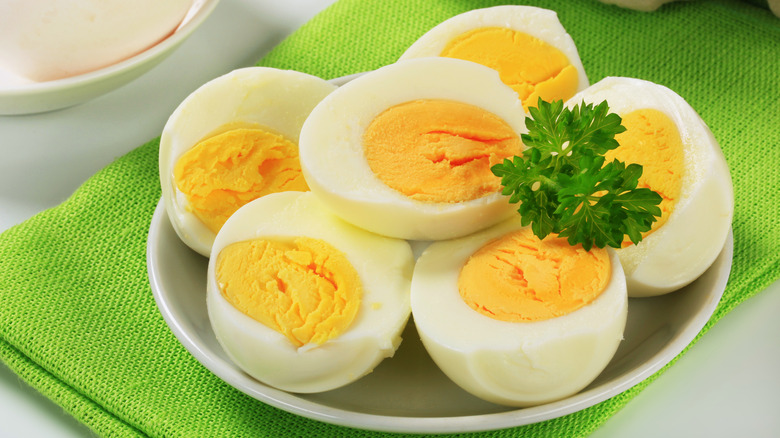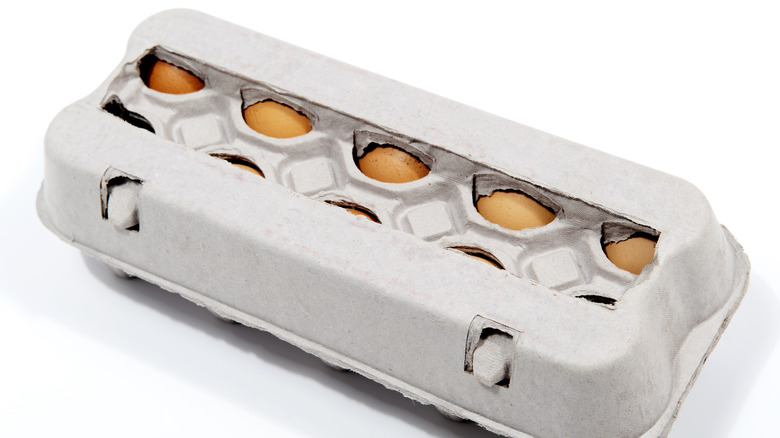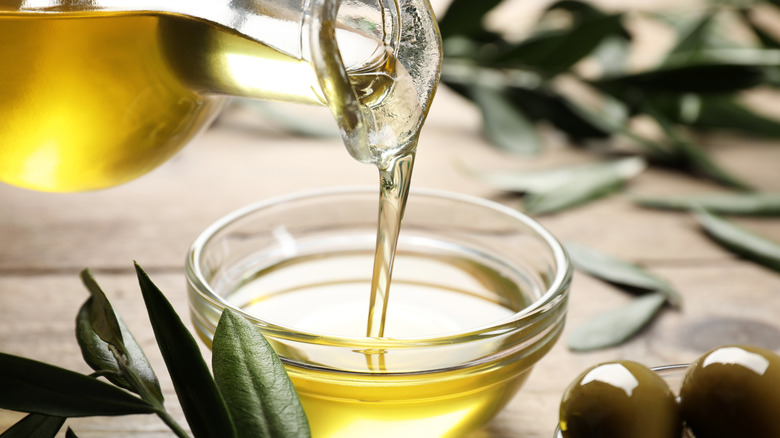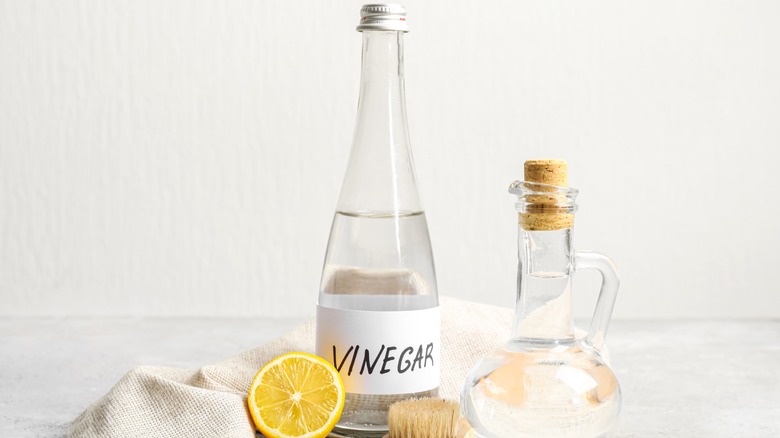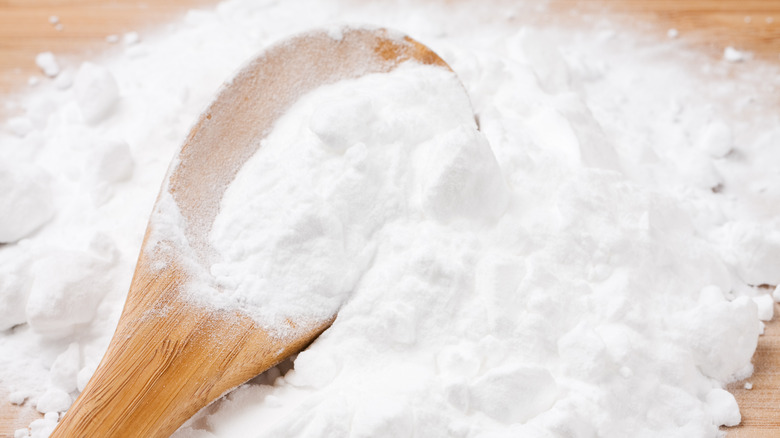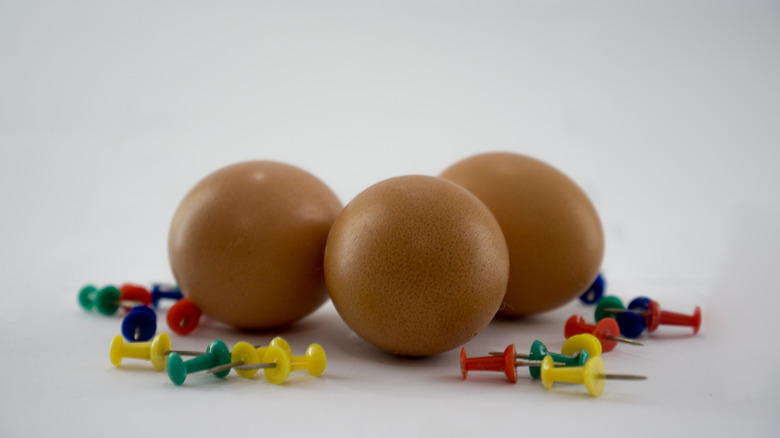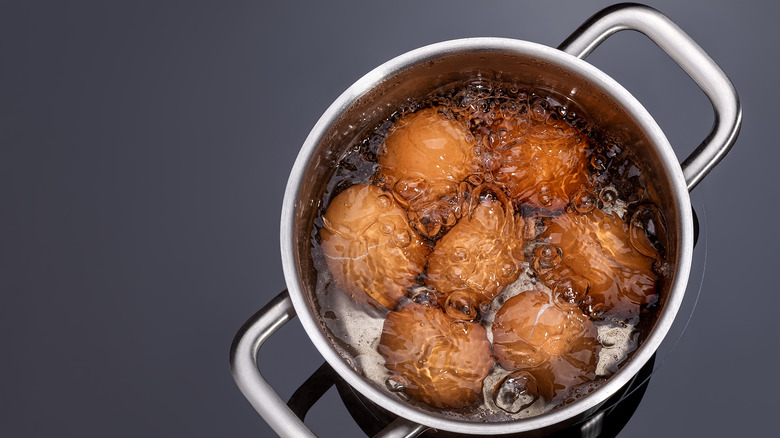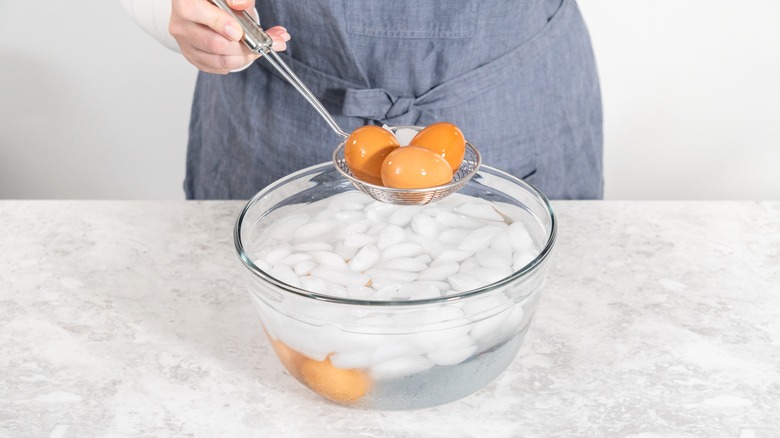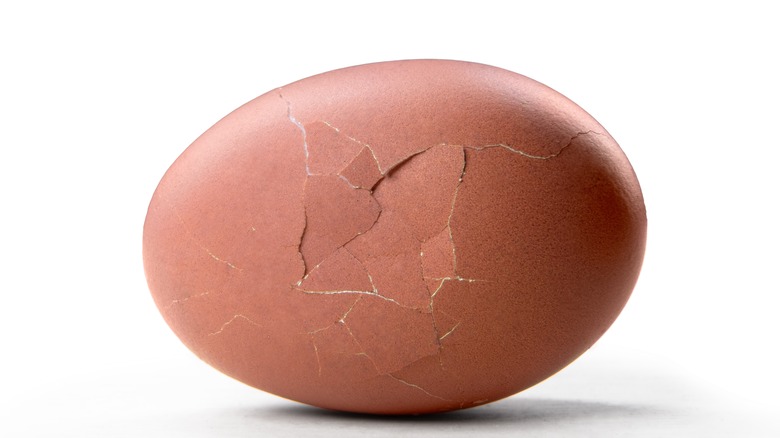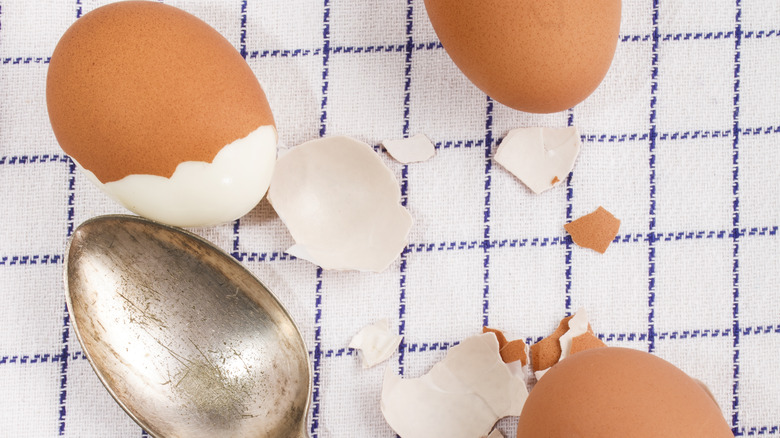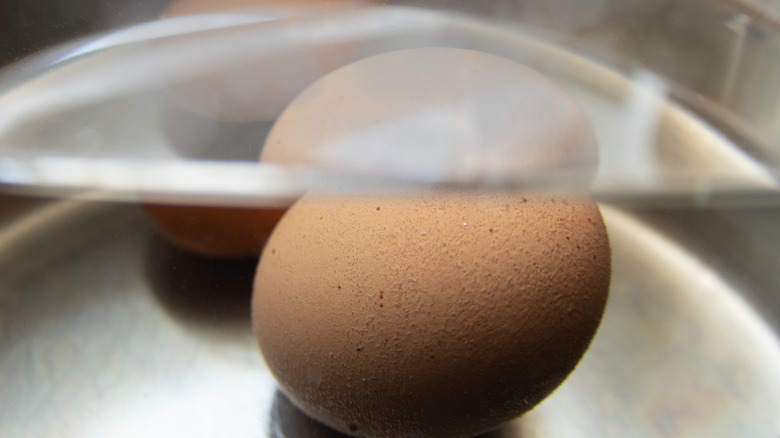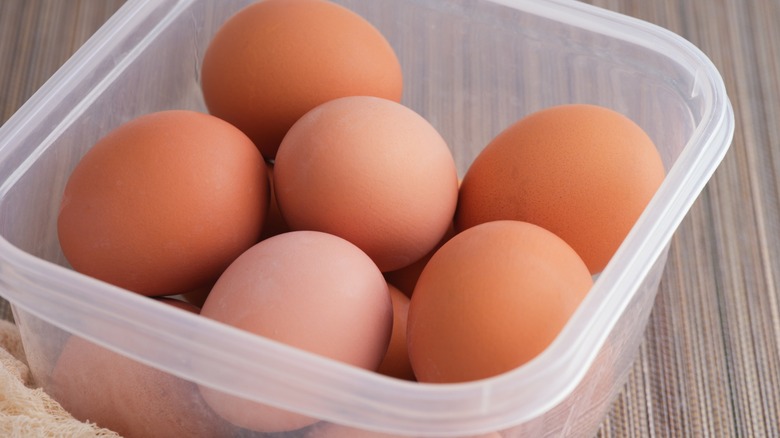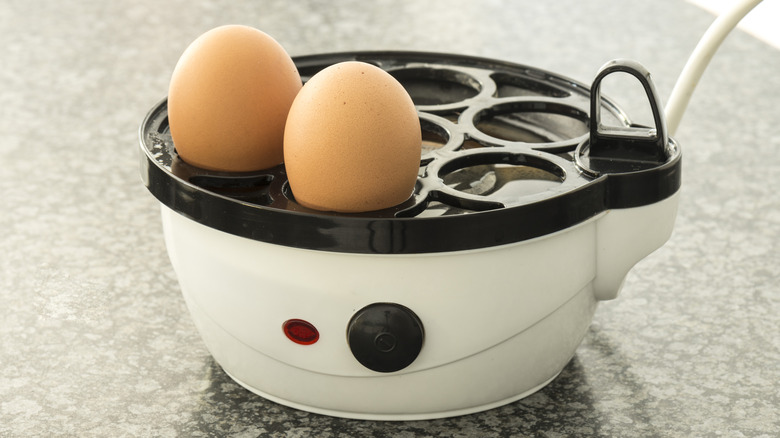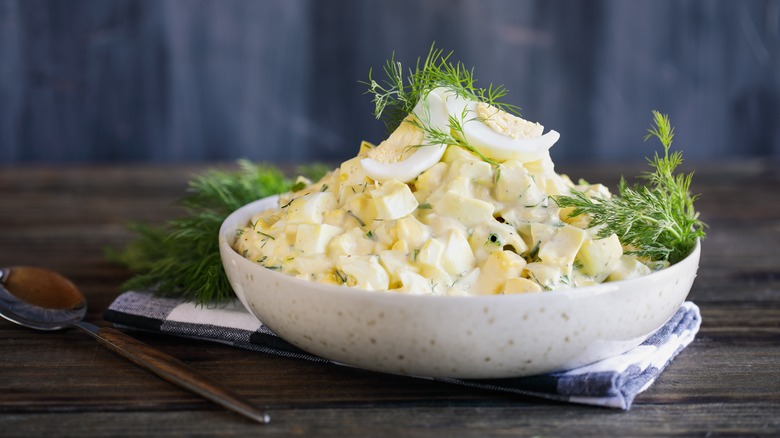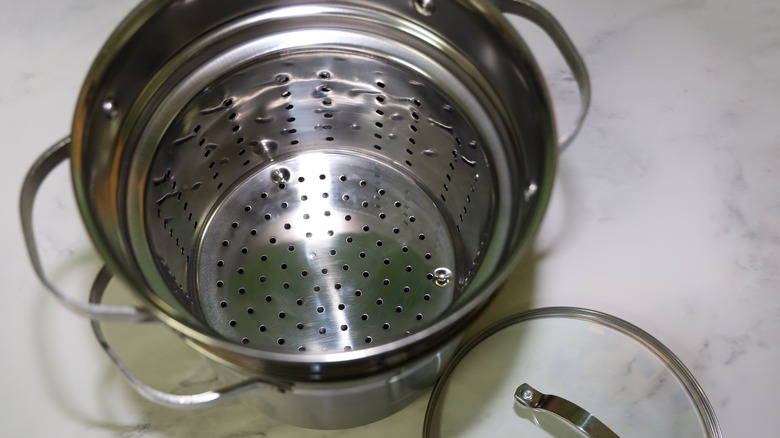15 Hard-Boiled Egg Hacks You'll Use Forever
Hard-boiled eggs are a great source of protein and can be enjoyed at any time of day. They're good on their own with a pinch of salt, and they make the perfect addition to a salad or bowl of noodles. You can also chop them up and put them on an egg salad sandwich or turn them into deviled eggs.
While there's no shortage of ways to enjoy hard-boiled eggs, cooking and peeling them properly can be tricky. If you've ever found yourself losing half of the egg white as you desperately try to peel the shell away, you're not alone, but don't give up on this versatile food. Making hard-boiled eggs doesn't have to be difficult, and with the help of these simple tricks — which range from what kind of eggs to use to how to cook and peel them — you'll be guaranteed smooth, perfectly cooked eggs every time.
1. Choose your eggs wisely
We typically think that the fresher our eggs are, the better. While that may be true for the perfect omelet, many people don't realize that fresh eggs aren't your best bet when it comes to hard-boiling. That's because fresh eggs have a lower pH level. When cooked, this acidity causes the egg whites to bond strongly with the inside of the egg's shell, which makes peeling difficult.
On the flip side, eggs that have been sitting in the refrigerator for a week or two have a higher pH level. Therefore, the whites won't adhere as strongly to the shell, and you can peel them with ease. Older eggs also have less moisture, which creates an air pocket between the egg and the shell and allows for a cleaner peeling process. When choosing eggs for hard-boiling, you should also be mindful of size, which will affect your cook time. Medium eggs only take about eight to 10 minutes to cook, but you'll need to tack on an extra minute or two if you're using larger eggs.
2. Add oil before you boil
Now that you've got your eggs, you're ready to start cooking, but before you crank up the heat, you have another opportunity to ensure that your shells slide right off your eggs: Try adding about a tablespoon of oil to the water before bringing it to a boil. You can use whatever kind of oil you have on hand; olive oil, avocado oil, vegetable oil, or canola oil will all do the trick.
A bit of oil in the water goes a long way because eggshells aren't as solid as they look. They're actually covered in thousands of tiny pores to allow gases to pass through. (That's how chicks are able to get oxygen and release carbon dioxide during the incubation period!) This porous exterior also means that oil can seep through and create a barrier between the egg white and the shell. With this slippery layer, your eggshells won't get stuck to the egg, and you can peel them off with no problem.
3. Add vinegar or lemon juice
Oil isn't the only thing you can add to your hard-boiled eggs recipe for a more painless peeling process. A couple tablespoons of vinegar poured into the water before it's boiling helps break the eggs' hard exterior down. With a pH level of 2 or 3, vinegar is very acidic. That acidity causes some of the calcium carbonate present in eggshells to dissolve, softening the shells and making them easier to peel off.
Not only does vinegar help with peeling, but its acidity also makes egg whites firm up faster. This means that if any cracks form in your eggshells as they're moving around in the boiling water, it's less likely that any egg white will escape through the cracks out into the water. This comes in handy if you are using older eggs because although they're easier to peel, they also have weaker shells. And you won't even get to the peeling stage if your shells are so weak that egg whites start leaking out during the cooking process. If you don't want to use vinegar (some people find that using too much gives the eggs an unpleasant flavor), lemon juice works just as well due to its acidity.
4. Add baking soda
Once your water is boiling, there's another ingredient you can add for smoother peeling, and the great news is, it's something you likely already have in your pantry: baking soda. With a naturally high pH level of 8 or 9, baking soda will increase the alkalinity of the boiling water, thereby raising the pH level of your eggs. When eggs are less acidic, the whites don't bond as strongly with the shell, meaning you won't end up with pockmarked, dented hard-boiled eggs after peeling them. All you need is ½ teaspoon of baking soda to see the results of this science-based hack.
This baking soda trick will make it easy to peel your eggs, even if they're fresh. Sometimes you want hard-boiled eggs the same day you pick up a new carton and can't wait for the eggs to become less acidic on their own. This hack ensures that you won't waste time prying the shells away from your eggs, no matter how old they are.
5. Use the thumbtack method
Now that we've explored some of the ways you can prime your water for perfect hard-boiled eggs, how about a hack that involves the eggs themselves? Using a thumbtack, poke a small hole in the wider end of the egg before boiling. While this method may seem strange at first, it has several advantages. First, water can enter the egg through this tiny hole, creating a barrier between the egg white and the shell and preventing the bonding that makes peeling a nightmare. Making a small hole in the egg also allows the air inside to escape during the cooking process, releasing pressure and decreasing the likelihood of the shell cracking.
It's important that you push the tack into the wider end of the egg. That's where the egg's air pocket is located and is therefore the best exit area for the gas to pass through. Just make sure your thumbtack is nice and clean before trying this hack!
6. Don't add the eggs too soon
Many people make the mistake of adding their eggs to a saucepan of cold water and then bringing it to a boil. However, waiting to add the eggs until the water is already roiling and bubbling makes for a smoother peeling experience. That's because slower cooking allows the egg whites to bond more strongly with the shell, whereas fast cooking on high heat prevents that bond from forming.
Starting your eggs off in cold water also makes it more difficult to gauge when they're done cooking. You may find that every time you hard-boil eggs this way, you end up with different results. Sometimes they're cooked just right, while other times they turn out runny or dry and crumbly. When you wait for the water to boil before adding your eggs, you can be sure you'll get the same results every time. To avoid cracked shells, make sure to lower your eggs into the water slowly and gently using a spoon, rather than just dropping them in.
7. Get your timing right
Once you turn on the heat, the proteins in eggs begin to form links with each other. This allows the liquid whites and runny yolks to firm up into a delicious and edible hard-boiled egg. However, when eggs are cooked for too long, too many bonds form, and the eggs become stiff and rubbery.
Nobody likes an overcooked hard-boiled egg. Not only are they crumbly and smelly, but they sometimes even have an unsightly green ring around the yolk, which is caused by the reaction of sulfur and iron compounds with the edge of the yolk. But how do you hard-boil an egg to perfection?
You should never leave your eggs in boiling water for longer than 10 minutes if you want to avoid overcooking. Eight or nine minutes is even better. Less than seven minutes, and the result will be more of a soft-boiled egg with a runnier yolk. For best results, set a timer the second you add your eggs to the water, and be ready to take them out right on time.
8. Give your eggs an ice bath
Taking your saucepan off the heat — or even your eggs out of the saucepan — is not enough to ensure that the eggs stop cooking when that timer goes off. As soon as the eggs have cooked for your preferred amount of time, plunge them into a bowl of ice water to abruptly stop the cooking process.
Without this step, the lingering heat inside the eggs continues to cook them after you've taken them off the heat. That means that your eggs can still wind up overcooked even if you remove them from the boiling water in a timely fashion. For best results with your egg bath, use a metal bowl to keep the temperature of the water nice and cool. While it can be tempting to remove the eggs as soon as the shells feel cool to the touch, leave them in the ice water for a solid 10 minutes to ensure that they've cooled thoroughly.
9. Crack by rolling
You've done everything you can to make sure that peeling your eggs is a breeze. Now it's time to actually put all these hacks to the test. When it comes to making that first initial crack in the shell, using the edge of a bowl is not the best method. Instead, try giving the wider end of the egg a firm tap on a cutting board or the countertop. Then, roll the egg around on the counter gently using the palm of your hand. This rolling motion creates cracks all around the shell rather than just one in the center. The cracks will loosen the shell, making it easier to pull away.
Once you're ready to start peeling, start at the wider end of the egg. The air pocket located there makes it particularly easy to strip the shell from the egg white. Once you've gotten your first section of shell off, the rest should slide away easily.
10. Peel with a spoon
Most of us use our fingers to peel eggs, but why not get a little creative and use a utensil for help? Spoons make the perfect egg peeling aid. This hack starts out like the previous one, with a firm tap of the egg's wider end on the countertop. Once you've done that, peel the egg just enough — starting at the bottom — so you can fit the tip of a spoon under the shell.
Next, hold the egg firmly in one hand and slowly slide the spoon around the egg with the other. The curve of the spoon should travel seamlessly along the curve of the egg, separating the shell from the egg white. The cracked shell will fall away easily, leaving you with a perfectly smooth, undented egg. This time-saving method is perfect for when you need to peel a lot of eggs quickly, like when making deviled eggs for a gathering.
11. Peel the eggs underwater
When it comes to peeling by hand, water works wonders. If you don't mind the cold, you can keep your eggs in their ice bath when peeling, but a bowl full of room-temperature water works better. Give the egg a tap on the bottom of the bowl before slipping the shell off underwater. The water acts as a lubricant, which makes it easy to peel off the shell without taking any pieces of egg with it. Working with an egg submerged in water also allows you to easily remove any lingering pieces of shell that may stick to the egg when peeling.
While it wastes more water, peeling eggs under a running faucet is another good option. It also provides an advantage you don't get with the bowl method: The force of the water helps remove stubborn eggshell fragments and sends them right down into the sink.
12. Shake instead of crack
Who says cracking an egg on a counter or a bowl is the only way to remove the shell? All you need is a little motion, and the eggs will crack themselves! This hack involves taking your eggs out of their ice bath and placing them directly in a plastic container. You want the eggs to have some room to move around, so choose the size of your container accordingly. Once the eggs are in place, add some cold water (enough to just cover the eggs) and place the container's lid back on.
Then, shake the container around vigorously until the shells start to separate from the eggs. Remove the lid, and you'll then be able to easily remove the shell from each egg in one piece. The shake method also works well with individual eggs. If you're eating just one for breakfast, you can try this technique with a water glass covered with the palm of your hand.
13. Skip the stovetop altogether
While boiling eggs on the stovetop is a tried-and-true method, it's not the only way to get the job done. If you can't seem to get the timing right and always end up with overcooked or undercooked eggs, why not try a different approach?
Electric egg cookers take all the guesswork out of hard-boiling eggs, and they take less time than the stove. You can also make hard-boiled eggs using a crockpot, an Instant Pot, an air fryer, or even the oven. For hard-boiled eggs in the oven, simply put one egg in each cup of a muffin tin. Then, bake for 30 minutes at 350 degrees Fahrenheit. You'll still need to transfer the eggs to an ice bath before peeling. Although cooking eggs in the oven takes longer than in a pot of boiling water on the stove, it's a great method if you need to make a large batch of eggs all at once.
14. Try the no-peel method
If peeling is your least favorite part of making hard-boiled eggs — and no amount of vinegar, poked holes, or spoons makes it sound more appealing — there is a way to skip this step altogether. The method was introduced by TikTok user @InJamiesKitchen, who proved just how well her no-peel hack works in a video with over 13 million views.
To start, pour some oil into a loaf pan, enough to coat the bottom. Next, crack your eggs directly into the pan. (Yes, you read that right! Throw those eggshells in the trash!) Place the loaf pan inside a baking dish and fill the dish with a few inches of water. Just like the muffin tin method, bake for 30 minutes at 350 degrees Fahrenheit. When you take the dish out of the oven, you'll have shell-less hard-boiled eggs that you can chop right up. This technique works perfectly if you're making a chopped Cobb salad or egg salad sandwiches.
15. Steam instead of boil
Another cooking method that yields perfect hard-boiled eggs is steaming. Boiling is a bit rough on eggs, from the hot temperature to the bubbling water moving them all around the saucepan. By comparison, steaming is a gentler, more controlled process. When your eggs are kept just above the boiling water, the steam envelops them and cooks them thoroughly and evenly. The result is a more moist and creamy hard-boiled egg. Steamed eggs get bonus points for being easy to peel, as the water vapor seeps through the eggshell's pores and loosens its hold.
All you need to make steamed eggs is a large, deep pot and a steamer basket. Many steamer baskets are adjustable, so you can use them with different-sized pots. The steaming process takes about 15 minutes, and the rich, perfectly textured eggs are worth the extra cook time. Keep in mind that you'll still need to put your eggs into a bowl of ice water when you're done cooking.
Making hard-boiled eggs that look and taste great can be a bit difficult at first. But with these tricks, you're guaranteed to have yolks cooked to perfection and smooth egg whites every single time. Once you try these hacks, you'll never go without them again.
